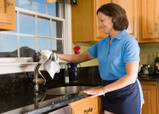Kitchen Cleaning Tips

Who doesn't want a clean kitchen? There probably are very few homeowners who don't mind a dirty kitchen. A mess is one thing, but dirt is another. Keeping a clean kitchen is important for health reasons, as many food-borne illnesses can be contracted through unclean countertops transferring dangerous germs.
Here you will read some kitchen cleaning tips to help enhance your cleaning experience, and maybe even cut down on the time needed to get your kitchen clean. If you are really short on time, a weekly cleaning person or cleaning service can be a huge help. Find reliable cleaning services in your area.
Tip 1: Don't Mix Cleansers
This is always an important point that can't be overstated. The reason cleansers should not be mixed is because of the potential dangerous chemical reactions, for example, if ammonia and bleach are mistakenly combined. Always take caution with chemical-based cleansers. You can minimize this potential hazard by using natural cleaning products.
Tip 2: Beware of Sponges for Counters
Sponges work well for cleaning, but also are a breeding ground for germs. Reserve your dish sponge only for the dishes and avoid keeping a sponge for wiping down counters. Instead, use paper towel sparingly, or consider using bar cloths or tea towels to wipe counters -- more economical and environmentally friendly than paper towels. Simply wash cloths in hot water with a bit of bleach to ensure they are disinfected.
Tip 3: Zap Your Dish Sponges
A great way to disinfect your dish sponge is to put it into the microwave for one minute. You can also wash the sponge in the dishwasher, but it may not remove as many germs as microwaving it. Even if you disinfect your sponge, make sure you replace it at least every 2-4 weeks.
Tip 4: Brush it Off
A toothbrush or other small, long-handled brush is a great kitchen cleaning tool to remove grime from the faucets and sink. Sanitize it regularly, by running through a cycle in the dishwasher or soaking in a bleach solution.
Tip 5: Be Careful with Stone Surfaces
Do not use anything other than Ivory liquid dish soap on marble , granite or other natural stone. Harsher cleansers may damage the surface. Always dry stone to prevent water spots. It stains easily, so wipe spills immediately before they set. Do not use vinegar or citrus-based cleaners; the acid in them will damage the surface. Peroxide is safe for stain removal.
Garbage Disposals
There are several ways to clean out a garbage disposal. For odor removal, try grinding lemon peel through the disposal. The acid in the peel will also help to clean out the drain. Another tip is to sprinkle a couple of tablespoons of baking soda down the drain, drop in two ice cubes and turn it on. Then run the hot water for a few minutes while the disposal is working.
Cleaning the Drain
You should give a thorough cleaning to your kitchen sink drain at least twice a year by deodorizing the drain. Pour in 1/2 cup baking soda followed by 1/2 cup white vinegar. Plug the drain tightly. Let the mixture sit for five minutes, then flush with boiling water. Do not use this combination after using any commercial drain opener or cleaner.
Microwave Cleaning Tips
To clean your microwave oven, mix together 2 Tbsp. lemon juice or vinegar and 2 cups water in a 4-cup glass microwave-safe bowl. Microwave on high 2 to 3 minutes. Carefully remove the bowl and wipe the oven's interior with a paper towel. A super simple way to clean the microwave (for light spills) is to boil a glass of water.* Leave the glass in the microwave a few minutes to allow the steam to set in. Remove the glass carefully (it will be very hot) and wipe down the oven. The steam works really well to remove any dirt.
*SAFETY TIP: To prevent superheating, insert a toothpick or wooden skewer in water before microwaving it.
Ovens
If you have a spill that burns on the oven floor, sprinkle a handful of salt onto the mess. The smoke will be reduced and the spill easier to clean after the oven cools. Add some cinnamon to the salt to reduce unpleasant odors. For heavy oven cleaning (if you don't have a self-cleaning oven), spread a paste of 3/4 cup baking soda, 1/4 cup salt and 1/4 cup water throughout the interior (avoid bare metal, and clog any openings with foil first); leave overnight. Remove with a plastic spatula and wipe clean.
Refrigerators
Try to do a quick wipe of the inside of your refrigerator about twice a month. You'll be surprised how much it helps to keep the fridge in good shape. For a fresh smelling fridge, use up stored food promptly and always keep a small open container of vinegar in a spot where it won't get tipped over.
Vent Hoods
Wipe the hood's exterior with hot, soapy water and a soft cloth once a week; rinse with a second hot, damp cloth. If you use your vent hood often, remove the filters once a month to soak in a solution of hot water and dish washing liquid. Brush gently with a plastic scrub brush. Rinse and dry well before replacing.
If you need help cleaning your home, find a reliable cleaner.
Updated October 17, 2018.
Looking for a Pro? Call us (866) 441-6648



